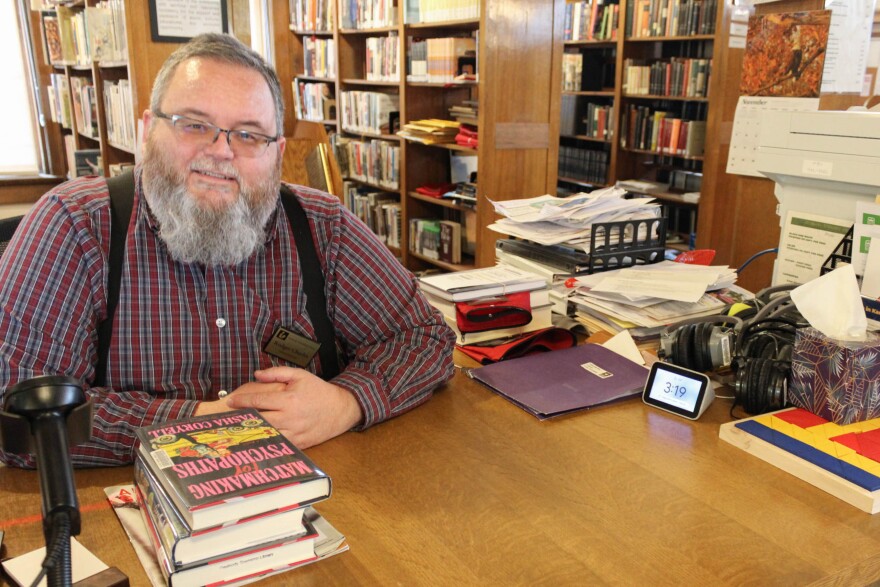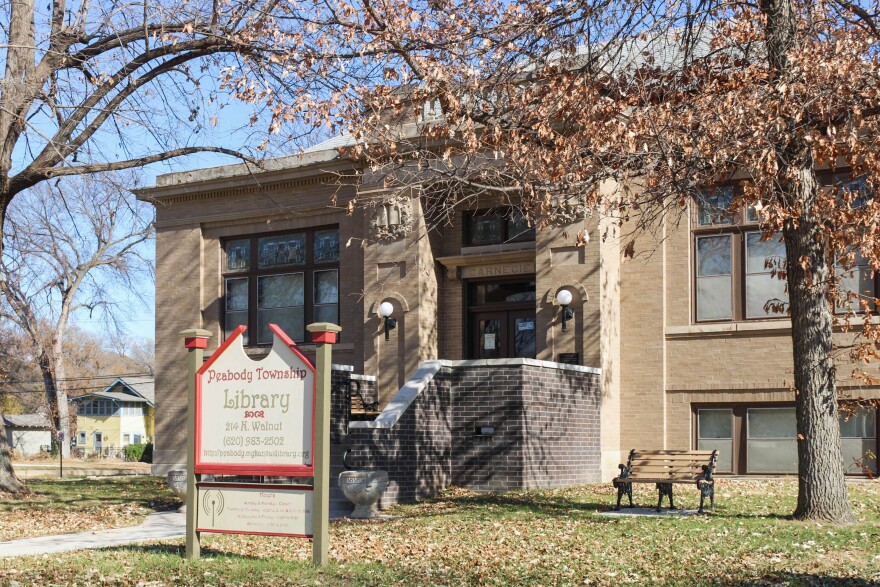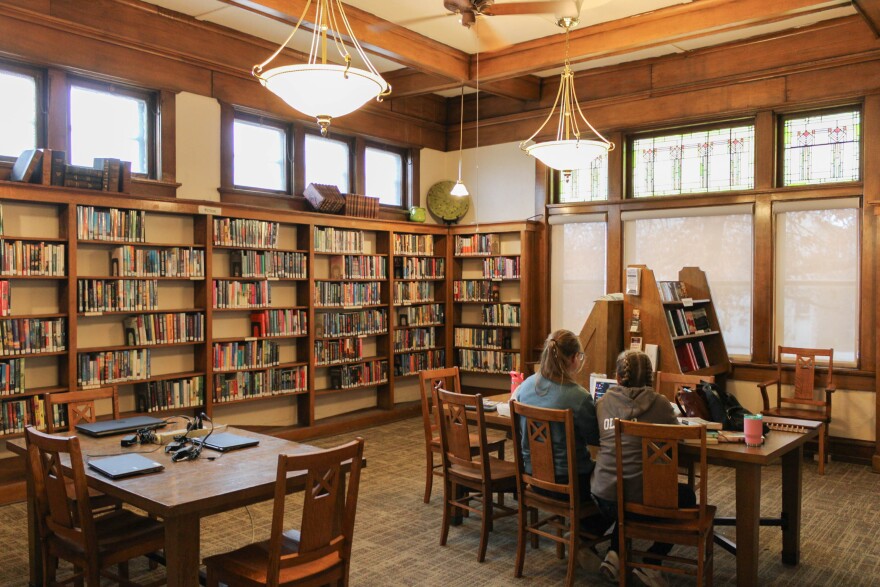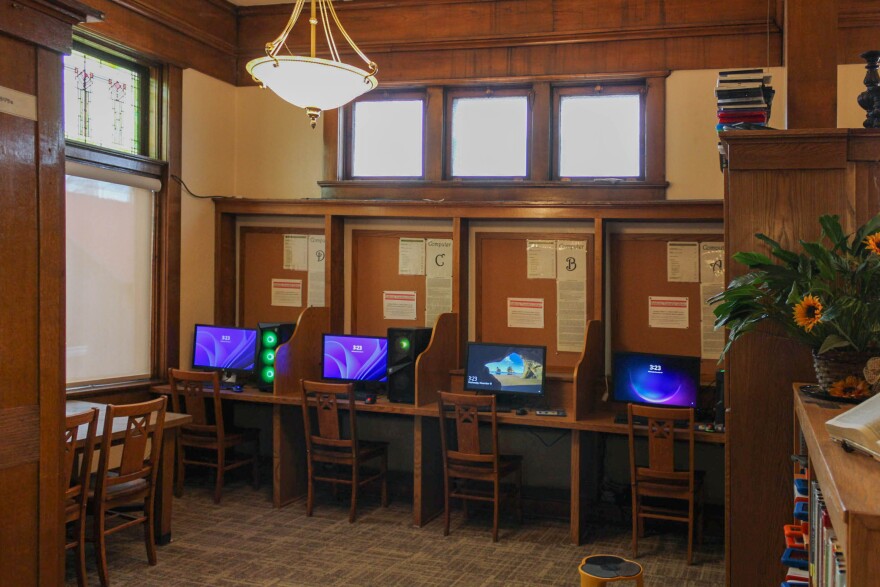When Peabody Township Librarian Rodger Charles got a call from the Carnegie Corporation of New York earlier this year, he didn’t think much of it.
He gave the speech he is ready to deliver to anyone who walks into the lobby and up the library’s steps. It’s a speech that covers the history of the library, its trials and triumphs and all the ways Charles and his staff use every inch of the building’s 2,000 square feet to serve the community of 1,100 people.
He largely forgot about the call.

Then in October, the corporation made a surprise announcement: Early next year, Carnegie libraries across the United States will receive a $10,000 gift in honor of the nation's 250th anniversary. The corporation sent emails congratulating the 1,280 eligible libraries — including Peabody.
“We were all looking at each other and going, it doesn’t mention anything about a Nigerian prince, does it?” Charles said. “Because this guy says Carnegie Foundation, but you know you can’t trust that.”
The announcement and the money are real, though Charles wasn’t the only one with doubts. The New York Times reports that hundreds of librarians hung up the phone when the corporation called with a vague request for library mailing addresses.
That’s because the last time many of these libraries heard from the Carnegie Corporation was more than a century ago.
The patron saint of libraries
The money is going to libraries that were built and paid for by industrialist and philanthropist Andrew Carnegie.
After making a fortune in the steel industry in the late 19th century, the Scottish-American magnate wrote “The Gospel of Wealth” for the North American Review. In it he wrote that “in bestowing charity, the main consideration should be to help those who help themselves.”
Carnegie considered library building as outranking “any other one thing that a community can do to help its people.” He spoke from experience. Carnegie began life poor and ended his formal education at 11. His access to an extensive collection came only when Col. James Anderson of Allegheny who opened his personal library to young workers like Carnegie.
From 1886 to 1919, Carnegie worked to share that experience with others by seeding the funds to build 2,509 libraries — 1,679 in the United States. He spent the modern equivalent of $750 million.
A library boom
Communities like Peabody were better for it. In 1913, Peabody received a $10,000 grant from Carnegie to construct a new Neoclassical building on Walnut Street. The building would support the town’s growing collection of works.

In 1874 the town’s namesake, railroad executive F.H. Peabody, donated the funds and original materials for a library. The library was the first free library in the state. By the early 1900s the library collection was stretching the limits of the tiny white building.
Then librarian Emma Christ joined with a local woman’s group and went looking for a solution.
“They heard that Carnegie was giving away libraries and so they filled out the forms, they applied and they got it,” Marcia Sebree, a member of the Peabody Township historical society said.
Carnegie’s library program was not a handout. Funding was only given to communities that agreed to provide the land, population and taxes to cover the cost of maintenance, materials and staff salaries going forward.
In 1914, the Carnegie library in Peabody Township opened its doors for the first time. It was one of more than 60 libraries built or supported by Carnegie in Kansas. Carnegie’s name appeared in buildings Garden City, Goodland, Coffeyville, Hiawatha, Wichita, and Emporia.
The Carnegie library in Canton, built in 1921, was the final library constructed as part of the grant program.

Not every Carnegie library was able to keep up with the realities of modern life. For some communities, a need for a bigger space, costly renovations or a shrinking population shuttered the buildings.
Charles joined the library staff in 2011 and he said that was almost the fate for Peabody.
“First year I was here, December came — we didn’t know if we were going to have enough money to make payroll in January,” Charles said. “It was so incredibly tight.”
A decision to increase the Peabody taxes supporting the library helped bring the budget up from about $20,000 to $108,000 over the last 15 years.
In Kansas, only 22 libraries operate out of the buildings that Carnegie and his corporation approved of and funded.
Those that do are cornerstones of their communities.
Thoroughly modern library
In Peabody, the building’s basement hosts town meetings, bridal showers, book launches and, on one occasion, a funeral.
“I have individuals in town that don't have a car, they don't have internet, they may not have electricity,” Charles said. “The only way they have connectivity outside the city limits of Peabody is to come up to the library and use our Wi-Fi. It's their only connection to the outside world.”

While inside Peabody is a happy participant of the digital world — with Wi-Fi access, computer stations, DVD rentals and smart lights — the feel of the library is largely unchanging.
“I have great grandparents that sat in these chairs, and now their great grandchildren are sitting in the exact same chairs they sat in when they were that age,” Charles said.
Sebree noted the constancy of the library as well. She went to high school in Peabody and remembers that when school got out, the library was the place to be.
“When you're a country kid and you're waiting around for a basketball game or something like that, you just have to find things to do,” Sebree said. “So the library is where we would end up sitting and visiting — probably too loud.”
When Sebree came to Peabody to take care of her ailing parents, she returned to the library with her infant grandson in tow. She took comfort in the familiar stacks and distracted herself by doing genealogy work from the collection.
Charles said the library’s board is still considering what to do with the gift. Unallocated funds are not a common occurrence for the library.
There’s a list of things the money could be used for: a charging gazebo to protect Wi-Fi users from the elements, updated appliances for the kitchen that residents use during community events, or stained glass windows depicting Peabody’s history.
Until that decision is made, Charles said he’s proud that Peabody’s library is “alive, we're healthy, we're growing, we're doing exactly what Andrew Carnegie wanted us to be. We're right on track.”


